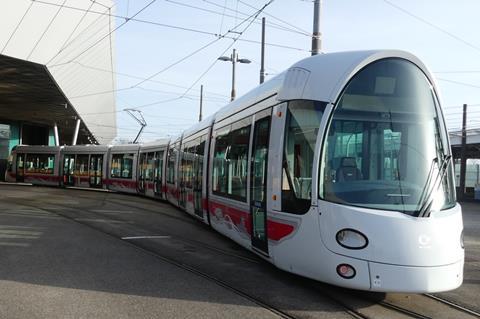
FRANCE: Construction works for Line T9 of the Lyon tram network are poised to start in mid-2024 following the government’s decision at the end of February to grant transport authority Sytral Mobilités a Déclaration d’Utilité Publique. Preliminary works to move water pipes and other services are already in hand.
Due for completion in early 2026, the 11∙3 km line with 12 new stations will link Charpennes with Vaulx-en-Velin La Soie. There will be 8∙8 km of new construction, the other 2∙5 km with seven stops being shared with existing tram routes 1 and 4 between Charpennes and Croix-Luizet.
At Charpennes there will be interchange with metro lines A and B with a further Line A connection at Vaulx-en-Velin La Soie, where passengers will also be able to connect to tram routes T3 and T7 and the Rhônexpress service to Lyon-Saint Exupéry airport.
Traffic is forecast to reach 38 000 passengers a day by 2030 with trams operating at 10 min intervals during peak times. End-to-end journeys will take 36 min with services achieving an average speed of 19 km/h.
Construction cost will be €290m. Works will include two crossings of the Canal de Jonage which feeds the Cusset hydroelectric power station.
Work on T9 will proceed at a similar pace to the 8 km Line T10, which will link Halle Tony Garnier with Gare de Vénissieux via the Saint-Fons area. This €295m project received its Déclaration d’Utilité Publique in October last year, with completion scheduled for 2026. Traffic is expected to reach 22 000 passengers a day by 2030 with trams running at 10 min intervals.
Rolling stock for both T9 and T10 will consist of Alstom Citadis 302 cars, nine of which will be used on route T9. Sytral is meanwhile expecting delivery of the first of 35 Citadis 402 cars destined to operate on routes T1 and T2. These 43 m long vehicles will be maintained at St-Priest depot, where modification work to accommodate them is due to be finished in August.
Sytral’s oldest Citadis 302 cars are in the meantime being modified with updated interiors and better accessibility as well as changes to the car ends to eliminate the risk of tram ‘surfing’; improved air-conditioning will also reduce energy consumption.
Elsewhere on the Sytral network, platforms at 29 stops on the busy route T2 and at seven stops on route T1 are being extended. The T1 works will be finished in 2025 at a cost of €27m.
In the longer term Sytral is studying plans for the TEOL (Tramway Express de l’Ouest Lyonnais) project which will be a 6∙5 km route connecting Jean Macé with Alaï. Between 3 km and 4 km of the route will be built in tunnel, taking the cost to around €800m. Traffic is forecast to reach 40 000 to 55 000 trips a day, depending on the final choice of route.

















